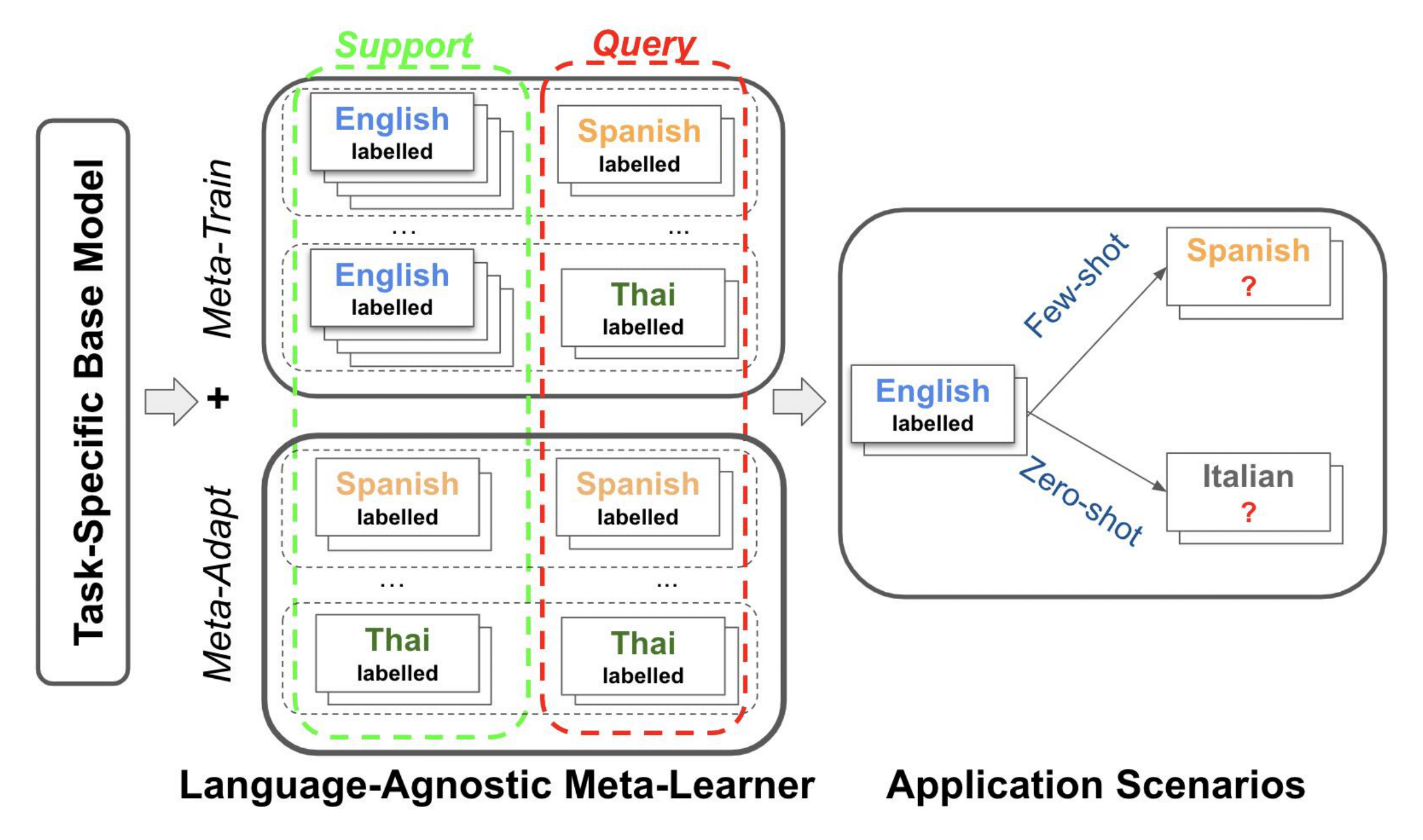This is a pytorch/learn2learn implementation for cross-lingual Transfer Learning NLU using different techniques of meta-learning. This repository contains code for replicating experiments for task-oriented dialogue and typologically diverse question answering using meta-learning algorithms described in this paper: "X-METRA-ADA: Cross-lingual Meta-Transfer Learning Adaptation to Natural Language Understanding and Question Answering" (M'hamdi et al. 2021) published at NAACL 2021.
N.B.: The repository is still being organized/refactored. If you have questions or comments, feel free to send an email to mmhamdi at usc.edu.
- Abstract
- Requirements
- Datasets
- Cross-lingual Few-shot Meta Pseudo-Tasks
- Meta-learning on Multilingual Task-Oriented Dialogue (MTOD)
- Meta-learning on Few-Shot TyDiQA
- Citation
- Credits
Multilingual models, such as M-BERT and XLM-R, have gained increasing popularity, due to their zero-shot cross-lingual transfer learning capabilities. However, their generalization ability is still inconsistent for typologically diverse languages and across different benchmarks. Recently, meta-learning has garnered attention as a promising technique for enhancing transfer-learning under low-resource scenarios: particularly for cross-lingual transfer in Natural Language Understanding (NLU).
In this work, we propose X-METRA-ADA, a cross-lingual MEta-TRAnsfer learning ADAptation approach for NLU. Our approach adapts MAML, an optimization-based meta-learning approach, to learn an adaptation to new languages. This adaptation is different from standard fine-tuning moving towards a more principled few-shot learning setup. We extensively evaluate our framework on two challenging cross-lingual NLU tasks: multilingual task-oriented dialog and typologically diverse question answering. We show how our approach outperforms supervised fine-tuning, reaching competitive performance on both tasks for most languages. Our analysis reveals that X-METRA-ADA can leverage limited data for a faster adaptation.
- Python 3.6 or higher.
- Depending on the task, you will need different requirements (and different package versions sometimes). For MTOD, run scripts: sh nlu/requirements_mtod.sh
- As there is a dependency conflict between version of transformers that we used to comply with XTREME and the one required by sentence-transformers, we use two different scripts requiring different requirements:
- sh qa/requirements_sim_qa.sh: to pre-compute the matrix of similarities between the support and query matrices
- sh qa/requirements_qa.sh: for the full script (using pre-computed similarities).
This code works for both public Facebook NLU dataset obtained using the same processing as mixed-language-training. Download the data and point --data-dir flag in pre_train_base.py and main.py towards their root directory containing the splits per language. If working with Facebook NLU dataset use tsv as --data-format, otherwise use json. The preprocessor will automatically know how to handle each dataset type.
For TyDiQA, please follow instructions in XTREME to obtain the train and test splits. We also provide here our further splitting of the train into 90:train for high-resource and 10:dev for low-resource settings.
For details on how the support and query sets are sampled to generate pseudo-labelled tasks, please refer to nlu/meta_reader.py which creates training and adaptation batches of tasks.
For details on how the support and query sets are generated for the meta-train and meta-adapt datasets, please refer to qa/pre_compute_similarities.py which relies on functions like find_similarities_query_spt in qa/data_utils.py. You can find, in the same link shared above, our pseudo meta-tasks splits for meta-train and meta-adapt for X-METRA-ADA saved as pickle files.
-
Initializing the parameters \theta_{0}:
-
PRE: Fine-tuning of the joint NLU Transformer model on English Train:
- Offline:
python main_pre_en.py --train --train-langs en --test-langs en es th --use-slots --data-format "tsv" --trans-model "BertBaseMultilingualCased" --data-dir "Facebook-NLU-Data/" --out-dir "out" --pre-train-steps 2000 --batch-size 32 --adam-lr 4e-5 --adam-eps 1e-08- As a part of the whole meta-learning or target language fine-tuning pipeline: run main.py which automatically calls main_pre_en functionalities for training and evaluation and to that effect run main.py without setting --use-pretrained-model flag
-
Use of saved pre-trained model for NLU: In this case, add --use-pretrained-model flag to main.py and provide the path to the binary pytorch file --pre-trained-model-name (see step 2 below)
-
-
Training X-METRA-ADA:
- Few-shot learning on Spanish, Zero-shot on Thai:
python main.py --option "META" --use-slots --train-langs en --dev-langs th --test-langs en es th \ --k-spt 6 --q-qry 6 --data-dir "Facebook-NLU-Data/" --out-dir "Results/few_shot_es/" --batch-sz 2500 --pre-train-steps 2000 --local_rank 0 \ --use-pretrained-model "pre_trained" --pre-trained-model-name $pre_trained_model_name --seed 42- Zero-shot learning on Spanish, Few-shot on Thai:
python main.py --option "META" --use-slots --train-langs en --dev-langs th --test-langs en es th --use-adapt --use-back --use-non-overlap \ --k-spt 6 --q-qry 6 --data-dir "Facebook-NLU-Data/" --out-dir "Results/few_shot_th/ --batch-sz 2500 --pre-train-steps 2000 --local_rank 0 \ --use-pretrained-model "pre_trained" --pre-trained-model-name $pre_trained_model_name --seed 42
Refer to nlu/scripts folder for a comprehensive list of experiments.
Refer to qa/scripts folder for a comprehensive list of experiments.
@inproceedings{mhamdi-etal-2021-x,
title = "{X}-{METRA}-{ADA}: Cross-lingual Meta-Transfer learning Adaptation to Natural Language Understanding and Question Answering",
author = "M{'}hamdi, Meryem and
Kim, Doo Soon and
Dernoncourt, Franck and
Bui, Trung and
Ren, Xiang and
May, Jonathan",
booktitle = "Proceedings of the 2021 Conference of the North American Chapter of the Association for Computational Linguistics: Human Language Technologies",
month = jun,
year = "2021",
address = "Online",
publisher = "Association for Computational Linguistics",
url = "https://aclanthology.org/2021.naacl-main.283",
doi = "10.18653/v1/2021.naacl-main.283",
pages = "3617--3632",
abstract = "Multilingual models, such as M-BERT and XLM-R, have gained increasing popularity, due to their zero-shot cross-lingual transfer learning capabilities. However, their generalization ability is still inconsistent for typologically diverse languages and across different benchmarks. Recently, meta-learning has garnered attention as a promising technique for enhancing transfer learning under low-resource scenarios: particularly for cross-lingual transfer in Natural Language Understanding (NLU). In this work, we propose X-METRA-ADA, a cross-lingual MEta-TRAnsfer learning ADAptation approach for NLU. Our approach adapts MAML, an optimization-based meta-learning approach, to learn to adapt to new languages. We extensively evaluate our framework on two challenging cross-lingual NLU tasks: multilingual task-oriented dialog and typologically diverse question answering. We show that our approach outperforms naive fine-tuning, reaching competitive performance on both tasks for most languages. Our analysis reveals that X-METRA-ADA can leverage limited data for faster adaptation.",
}
The code in this repository is partially based on: mixed-language-training for the task-oriented dataset and cleaning code, XTREME for base models, datasets and processing of TyDiQA, and learn2learn for X-METRA-ADA algorithm
